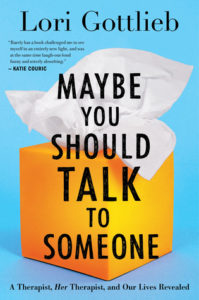Highlights & Annotations
Nothing is more desirable than to be released from an affliction, but nothing is more frightening than to be divested of a crutch - James Baldwin
I also know something less commonly understood - that change and loss travel together. We can't have change without loss, which is why so often people say they want change but nonetheless stay exactly the same.
Sullivan theory – issues boil down to relational ones
- “people's interactions with other people, especially significant others, determine their sense of security, sense of self, and the dynamisms that motivate their behavior.”
'The truth does not change according to our ability to stomach it.' - Flannery O'Connor
Bion – start every session 'without memory, desire or understanding'—his antidote to those intrusive influences that otherwise threaten to distort the analytic process
“Honesty is stronger medicine than sympathy, which may console but often conceals” - Gretel Ehrlich
Jung collective unconscious – “Part of the part of the mind that holds ancestral memory or experience that is common to all humankind, where as Freud interpreted dreams on the object level, meaning how the content of a dream related to the dreamer in real life. The cast of characters, the specific situations. In Jungian psychology dreams are interpreted on the subject level meaning and how they relate the common themes in our collective unconscious it's no surprise that we often dream about our fears. We have a lot of fears. What are we afraid of? We are afraid of being hurt. We are afraid of being humiliated. We are afraid of failure and we are afraid of success. We are afraid of being alone and we are afraid of connection. We are afraid to listen to what our hearts are telling us. We are afraid of being unhappy and we are afraid of being too happy. In these dreams inevitably we are punished for our joy. We are afraid of not having our parents approval and we are afraid of accepting. We are afraid of bad health and good fortune we are afraid of our envy and of having too much. We are afraid to have hope for things that we might not get. We are afraid of change and we are afraid of not changing. We are afraid of something happening to our kids, our jobs. We are afraid of not having control and afraid of our own power. We are afraid of how briefly we are alive and how long we will be dead. We are afraid that after we die we won't have mattered. We are afraid of being responsible for our own lives. Sometimes it takes a while to admit our fears especially to ourselves.” – Ch.19
So many of our destructive behaviours take root in an emotional void. An emptiness that call out for something to fill it. – Ch. 20
“Freedom involves responsibility” – Ch.22
“Insight is the booby prize of therapy….You can have all the insight in the world, but if you don’t change when you’re out in the world, the insight and the therapy is worthless….The insight gives you choices, but it’s up to you to make them.” – Ch.22
“Follow your envy. It shows you what you want.” – Ch.23
Re: Google people that are no longer in your life – “Holding onto a future that had been cancelled...staying locked in the past. All you [have] left in common is your history.” Ch.27
“Modern man thinks he loses something - time - when he does not do things quickly. Yet he does not know what to do with the time he gains, except kill it.” – Erich Fromm – Ch. 36
- When we get extra time by working quickly, we usually kill it by doing unimportant things
Irvin Yalom –four 'ultimate concerns': Death, Isolation, Loss of freedom, and Meaningless – Ch.37
- Existential psychotherapy - our awareness of death helps us live more fully
“Between stimulus and response there is space. In that space is our power to choose our response. In our response lies our growth and our freedom.” V. Frankl – Ch. 40
“People with cherophobia are like teflon pans when it comes to pleasure.” – Ch. 41
“What do we owe our parents?” – Ch.41
“You can have compassion without forgiveness.” – Ch.41
“Safe inside a shell of pain.” – Ch.41
Whole of Ch. 43 – What Not to Say to a Dying Person
“There’s no hierarchy of pain” – Ch.47
End of Ch. 50 – Deathzilla re: Julia talking about afterlife
Rupture and repair – if your childhood traumas were met with compassion – Ch.54
Re: Passing down of trauma between Rita and Robin – Ch.54
“Change happens gradually, then suddenly.” – Ch.56
